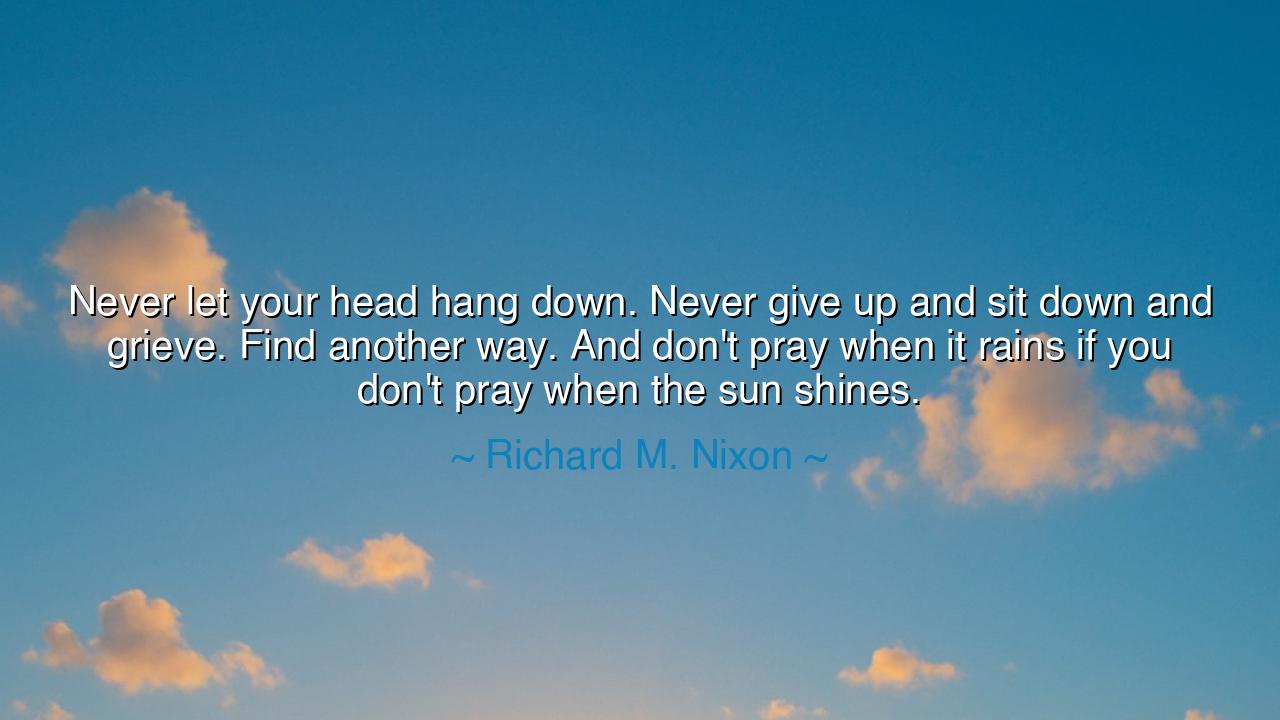
Never let your head hang down. Never give up and sit down and
Never let your head hang down. Never give up and sit down and grieve. Find another way. And don't pray when it rains if you don't pray when the sun shines.






"Never let your head hang down. Never give up and sit down and grieve. Find another way. And don’t pray when it rains if you don’t pray when the sun shines." Thus spoke Richard M. Nixon, in words that outlived the shadow of his fall. Though his name is often remembered for scandal, these words rise above his frailties, echoing with the cadence of endurance and balance. They call us to hold fast in adversity, to refuse despair, and to seek constancy in both storm and calm.
The ancients taught much the same. The Stoics declared that a man must not bend beneath misfortune, but rise unbroken, his head lifted high. Epictetus, though a slave, proclaimed that no one can force you to give up, unless you consent. Grief may come, but to dwell in it, to sit in ashes and yield, is to surrender your very soul. Better to stand, to search for another way, and to keep moving forward, however small the step.
History bears witness in the life of Abraham Lincoln. Stricken by loss, battered by failure, he might have laid his dreams in the grave alongside his sorrows. Yet he did not grieve without action. He lifted his head, tried again, and in so doing became the leader who preserved a nation. His example is the embodiment of Nixon’s words: endurance, perseverance, and faithfulness not only in storm, but in sun.
The final counsel is perhaps the deepest: "Don’t pray when it rains if you don’t pray when the sun shines." It is a warning against hypocrisy, against turning to the divine or to principle only when trouble comes. The ancients offered the same: to honor the gods not only in famine, but also in harvest; to be steadfast in devotion, lest faith become mere desperation. Constancy in gratitude gives strength in trial.
Therefore, let this wisdom endure: hold your head high, refuse to give up, and let not grief chain you to the ground. Seek another way when the first path fails, and keep faith in all seasons, not only in the hour of need. For the man who endures with courage, and who walks with constancy through both sunshine and storm, shall rise above despair, and in rising, teach the generations that life’s worth is measured not by ease, but by resilience.






HHanh
I’m really drawn to the determination in this quote. It’s a reminder that we shouldn’t just give up or stay down when faced with challenges. But I also feel that sometimes it’s okay to take a moment to reflect and even grieve. Does this quote suggest that we should be constantly pushing ourselves to be strong, or does it underplay the importance of moments of vulnerability? Is there a balance between perseverance and giving ourselves space to feel?
LLioz
This quote seems to convey a kind of tough-love philosophy, encouraging us to keep moving forward even when the going gets tough. However, I wonder—can we really expect ourselves to never sit down and grieve? Isn’t part of healing taking the time to process emotions? Also, the idea of not praying only when it rains feels like an interesting challenge to our human nature. Shouldn’t it be okay to seek comfort in times of struggle?
SDSpa Duongsinh
I appreciate the sentiment behind this quote—keeping your head up and not giving in to despair. It’s a powerful reminder to stay proactive. But what about the idea of prayer? Nixon’s point about praying in both good and bad times is thought-provoking. Does this imply that we should remain constant in our faith or efforts, even when things seem hopeless? Can we be honest with ourselves about needing a break from that constant ‘strength’?
QBNguyen Quoc Bao
This quote really speaks to the importance of resilience and consistency. Nixon’s message seems to be about not letting adversity define you, and instead, finding ways to push through difficult times. But, I can’t help but wonder—what happens when it’s really hard to find that strength? Is it always possible to ‘find another way,’ or are there times when we need to accept that a different approach might be necessary?